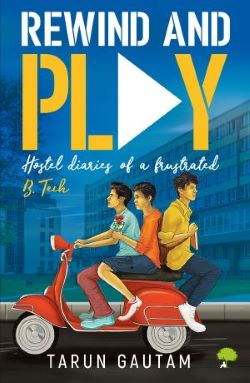Tarun Gautam rewinds to his college days

Team L&M
IIM-Lucknow alumni Tarun Gautam works for a leading technology firm. Someone who takes keen interest in social initiatives and environment-related issues, Gautam has been closely involved with Let’s Do it Delhi campaign to create awareness about cleanliness in the city. Recently, he shared a proposal with the Delhi government on how it can reduce vehicular pollution and traffic in the city. Gautam has just come out with his first book, Rewind And Play (TreeShade Books) which promises to take us to perhaps the best phase of our lives – the college days. We talk to the debut author…
How and when did it strike you to pen a book on days spent in college?
In my growing up years in school, I took a keen interest in writing and dreamt that at some point I will write a book. Lately, I’d read a few book on college life and somehow felt that my college life was far more eventful and if penned in a book it would make an interesting read.
Though slotted as a work of fiction, are the characters and stories in Rewind And Play from the days of your college life?
Yes, the characters and stories are very much based from my college life. Though the stories have been vastly modified in essence these occurred in some shape or form during my college days.
You have been involved in the Let’s Do It Delhi campaign. How successful do you think has been this endeavour? If not, what are the reasons that you attribute to not having been able to not do anything despite doing everything? In such a situation, does your frustration levels go up or is it that of anger?
The Let’s Do It Delhi campaign was the Delhi edition of an international initiative called Let’s Do It. In 2011, when I was associated with it, cleanliness in the Capital was not a focus area. However, thanks to all the volunteers we were able to take the message of cleanliness to people and make a positive difference to several areas in Delhi. At that time, I was in IIM-Lucknow, Noida campus and was able to get students to do a cleanliness drive at the Red Fort. Similarly, I participated in another campaign to clean-up a slum in Delhi. On the whole, I believe I was moderately successful in this endeavour.
In hindsight, I believe there are two areas that could have been addressed better. The first is the creation of the need for cleanliness among the people. Till people themselves don’t believe cleanliness is of utmost importance, these campaigns will not achieve a high degree of success. Second is the issue of sustainability. One-off campaigns are fine but till these are not engrained as processes in communities they typically die-out. Yes, one does get frustrated when desired results are not achieved but that is not the answer. The answer lies in channelising one’s frustration to achieve a constructive result. I believe that improving India is a DIY project and till people don’t get involved in such initiatives we will be in the state we are in.
What and how has been the response of your proposal to the Delhi government to implement the Work-From-Home system to reduce vehicular pollution and traffic? And why city government and not the Central Government?
When I came up with the idea of Work-from-Home as a way to reduce vehicular pollution, I was expecting to face a lot of resistance from the government. I was prepared to face rejection and delays. After emailing the idea to the Chief Minister, I received an acknowledgement from his office and the Delhi Dialogues Commission. Though they responded concurring with the strength of the idea, there wasn’t much traction thereafter. I even contacted Sunita Narain (Centre for Science and Environment). However, after initial communication, I didn’t hear from her.
The AQI (Air Quality Index) in Delhi has been consistently been in the ‘severe quality’ hence, there’s a need to take drastic measures to improve the air quality. My hypothesis is that if I can get the Delhi government to promote this initiative it will mostly certainly be taken up other state governments. Being the Capital, other states look up to it and improving it first will have a cascade effect on other cities.
Life in school vs life in college…
Compared to my school life, my college life was exhilarating to say the least. In college, I was able come out of my comfort zone and explore a lot of new areas. In fact, at one stage I started to think my extra-curricular activities had started take up more of my time than my studies. I became an avid quizzer and a keen tennis player. I also participated in technical presentations and cultural events whereas in school I was mostly confined to studies or the occasional game of cricket. I believe that one should try to lead a holistic college life and not just get bogged down by studies. College life is truly a journey where you get a chance to discover a lot about yourself.
Your ideas germinate from…
My ideas mostly germinate from thoughts that I’m passionate about. It could be about my own challenges; challenges of the youth in an evolving India; lives of people I observe around me.
What is that one thing which is the most important part of a book?
To my mind the most important part of the book is the theme and how that theme is done justice by the author.
Is writing energising or exhausting?
Writing is mostly energising but at times when you suffer from writer’s block it can be exhausting.
Any book that inspired you to take up writing?
There is no particular book that has inspired me. However, All Quiet on the Western Front by Eric Maria Remarque, a satirical book on World War I exposed me to a different style and left a lasting impression on me.
Share some something about your family…
My late father was in the Indian Air Force and my mother is a retired school teacher. I have an elder sister who is a doctor. My childhood has been spent in different parts of India such as Jodhpur, Delhi, Bangalore and Patiala.


